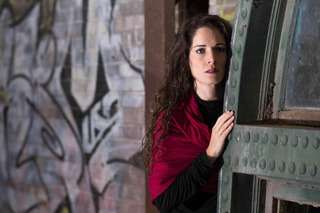|
Back
A riveting world premiere Toronto
Evergreen Brickworks
05/26/2015 - & May 27, 28, 29, 2015
John Harris: M’Dea Undone
Lauren Segal (M’Dea), Peter Barrett (Jason), James McLean (President), Jacqueline Woodley (Dahlia)
Jordan de Souza (conductor)
Tim Albery (director), Michelle Tracey (set and costume designer), Jason Hand (lighting designer)

L. Segal (© Dahlia Katz)
This 75-minute contemporary treatment of the ancient Medea story packs a real punch. Toronto-based librettist Marjorie Chan was paired up with UK composer John Harris in 2009 when Tapestry Opera conducted a workshop. In what amounts to compositional speed-dating, they were assigned to write/compose a scene from Euripides’ play on the subject. Six years later, after much re-writing (which involved the disappearance of the scene they originally worked on), the work has sprung vividly to life.
In this present day setting, Jason is an American war hero of some renown who arrives home from a foreign war with a woman, M’Dea who was his interpreter. They have a little boy, Chase. Jason is greeted by no less than the President who wants him as a running mate. Jason quickly links up with the President’s daughter, Dahlia. What follows is the brutal, inexorable denouement much like that of the ancient mythic drama as M’Dea kills Dahlia, then the boy and (in this version) herself.
The power of the tragedy derives not just from the murder of a child, but from the deep causes of Medea’s (and M’Dea’s) fury. She made a life-altering decision to turn on her own people to assist Jason in his quest (Chen’s libretto refers to torture and executions, plus the disappearance of M’Dea’s home village). This gives the work an extra tragic layer beyond a woman abandoned by a man. The terse libretto lays all this out in eight connected scenes.
M’Dea is obviously from a place like Iraq or Afghanistan, but the character is given no folkish or ethnic identifiers - she does not speak or sing with accented English or wear distinctive garb. One indicator of foreignness is when she scatters a red powder on the stage as she prepares her vengeance.
Director Tim Albery is a master at delivering big dramatic gestures that can astonish in their boldness and absolute rightness for the moment. (His direction of Die Götterdämmerung for the Canadian Opera Company in 2006 is proof.) The wide playing area of the venue (an old industrial building that once housed the kilns of a brickworks) is separated into four distinct mini-stages and the action moves from place to place. At times we see action happening in two places at the same time; at one peak moment furniture gets destroyed. The electrifying finale has the players climb a scaffolding that rises up into the rafters.
It is difficult to fully assess the music’s contribution to the success of the work. The orchestra consists of just seven string players (two each of violins, violas and cellos, plus one double bass), and there is also a pre-recorded tape. Some of the electronic sounds are quite subtle, often just extending the tones of the live instruments before adding sounds that are further afield. However, the venue is near two busy highways and it was impossible to sort out the electronics from the constant traffic noise. In an interview Harris described his music as “bitonal”. Basically it is tonal and gives lots of scope for both lyrical and dramatic utterance. The final impression is that the music supports the libretto. (Prima le parole e dopo la musica, to turn Salieri’s title on its head.)
Aside from the exterior noise, the acoustics of the space are terrific. What mostly attracted me to the performance was the engagement of four top-notch singers and they all did themselves proud. I have long been a fan of Lauren Segal and she just gets better and better. From the first phrases when she sings a lullaby she establishes a vocal and dramatic character. Jason then enters and Peter Barrett uses his own personal charm and warmth to establish a sympathetic character who is quickly beguiled by the promise of power and then the alluring Dahila.
Veteran tenor James McLean gives a riveting performance of a man with laser-like focus on his exalted position and aims. Jacqueline Woodley makes absolutely electrifying use of her lovely voice to create a character who is both dislikable and then pitiable in her gruesome death scene. Silent roles are deftly handled by Elishka Roux as the little boy, Chase, and Chris Harvey and Simon Mizra as Secret Service Agents.
M’Dea Undone is a co-production with Scottish Opera, for whom John Harris has done previous work. As demonstrated in Toronto, with the right cast, setting and direction, the piece works very well.
Michael Johnson
|